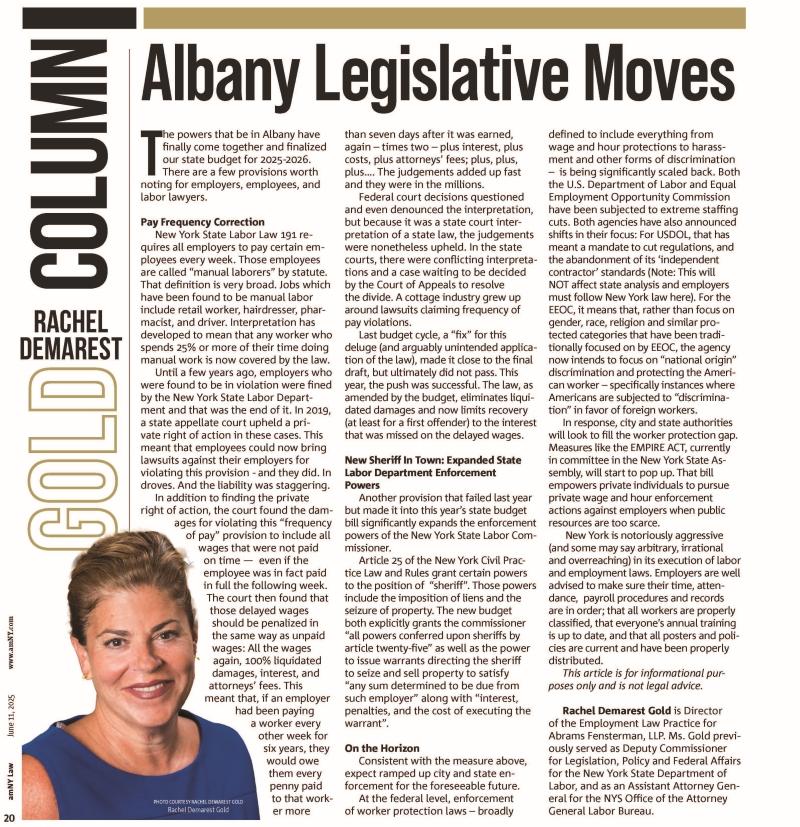Effective July 24, 2011, New York became the sixth state in the country to legalize same-sex marriage, joining Massachusetts, Connecticut, Iowa, Vermont, New Hampshire, and Washington, D.C. The new law – – the Marriage Equality Act – – amends the statutory definition of a marriage in Section 10-a of the New York Domestic Relations Law to provide: “A marriage that is otherwise valid shall be valid regardless of whether the parties to the marriage are of the same or different sex.” The new law mandates that same-sex and different-sex marriages be treated the same by the government. This means that the government may not deny rights, benefits, protections, privileges or responsibility relating to marriage because the partners are of the same or different sexes.
The Marriage Equality Act means that same sex spouses will likely be deemed to be spouses for all employment-related purposes. We will have to await the development of case law to determine the full impact of this new legislation.
Employers may be surprised to learn that certain legal protections already exist for same-sex unions, even if the parties are not married. These include bereavement leave; health care benefits; and family and medical leave for children of same sex couples.
Bereavement leave for the death of a spouse, parent, child, or close relative must now offer the same leave for the death of a same-sex partner, or for the death of the parent, child or other close relative of the same-sex partner. The new law does not mandate providing bereavement leave; employers still have the option to choose to provide this benefit or not. However, if it is offered, it must be offered equally to same sex families. While there may be some employers who oppose same sex unions on religious grounds, this law does not contain any exemptions, and it applies to all size employers. One issue that employers may face is how to verify that there is a bona fide same sex union without running afoul of New York State’s prohibition against discrimination on the basis of sexual orientation. Another issue is whether the religious exemption provisions of the Marriage Equality Act will apply if and when the same sex couple marries in New York.
– Health Insurance Benefits for Same Sex Partners: In 2008, New York’s Insurance Department issued a ruling which requires that same sex partners be permitted to participate in health insurance plans if they were validly married in a state that recognizes same sex unions. In essence, the Insurance Department held that a valid marriage in another state must be recognized in New York, and the parties must be treated as though they are spouses.
Courts have also held that participants in a same sex union performed in a state that recognizes the marriage qualify as spouses for purposes of health benefits. In one case, this meant that a community college employee qualified for spousal health care benefits. In another case, this meant that an executive order which recognized out-of-state same sex marriages for purposes of public employee health insurance coverage and other benefits was deemed valid.
In 2009, President Obama signed a presidential memorandum extending health benefits to same sex partners of federal employees.
In 2011, a New York appellate court ruled that an employer did not engage in sexual orientation discrimination by offering health care benefits to “same sex” domestic partners, but not offering it to “opposite sex” domestic partners. The court found that there was a rational basis for the distinction since heterosexual individuals living together could obtain health care benefits by marrying, but same sex partners could not marry in New York at such time. The enactment of the Marriage Equality Act could well change the result if the same case was to arise in the future.
– Family and Medical Leave Coverage in Same Sex Unions: The U.S. Department of Labor recently published a fact sheet which expands coverage under the Family and Medical Leave Act (“FMLA”) to provide leave for birth, bonding, or to care for a child with a serious health condition on the basis of an “in loco parentis” relationship, which could provide these statutory rights to participants in a same sex union. The FMLA has always provided leave benefits to an individual acting “in loco parentis” or as a parent to a child, even if the person is not a birth parent. The Department of Labor has determined that “[a] person who will co-parent a same-sex partner’s biological child may take leave for the birth of the child and for bonding.” Similarly, that partner would be able to take leave to care for the child’s serious health condition. Persons who take on the role of a parent and assume day-to-day responsibilities to care for, or financially support, a child are deemed to be acting “in loco parentis”, whether or not a biological parent also exists. The factors considered in determining whether the standard has been met include:
• The age of the child;
• The degree to which the child is dependent on the person;
• The amount of financial support, if any, provided; and
• The extent to which duties commonly associated with parenthood are exercised.
The ability for someone acting in loco parentis” to take leave is not new. What is new is that the U.S. Department of Labor has specifically acknowledged the application of this standard to same-sex unions.
As society changes, case and statutory law change. The recognition of same sex unions has created an evolving body of law defining when an employer must afford the same rights given to heterosexual couples to partners in a same sex union. We anticipate that the laws in this area will continue to change quickly. It is important, therefore, for employers and employees to seek competent legal counsel when confronted with these types of issues.
* * * *
For more information about employment-related issues, please contact Sharon P. Stiller, Esq. or your attorney contact at our firm.





